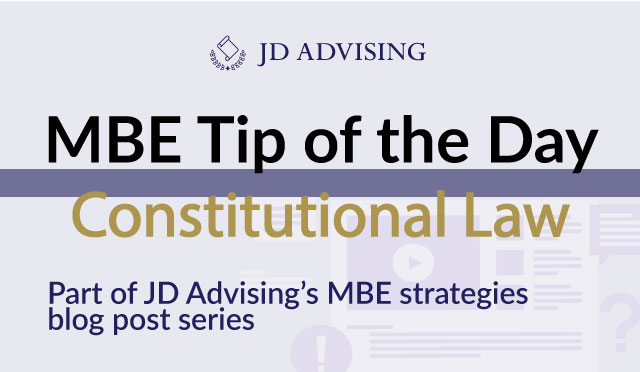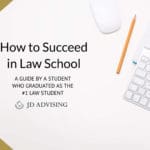MBE Strategies Tip #7 – Constitutional Law
MBE Strategies Blog Post Series: Welcome to our MBE tips and tricks blog post series! Today, we will be covering a Constitutional Law MBE question. Even though most students do not hate Constitutional Law questions (generally, Real Property and Contracts are hated more!) Constitutional Law has been among the subjects that students score the lowest on the real bar exam. Thus, it is important to have a good strategy to tackle Constitutional Law MBE questions.
You will see 25 Constitutional Law MBE questions on the Multistate Bar Exam.
We will be posting a Multistate Bar Exam question once every couple days along with an answer. This series lasts throughout a bar exam administration and continues when the next administration starts. Note that these are MBE questions that students commonly get wrong. If you can master these MBE questions, it could increase your MBE score by that many points if you see any of these issues tested again (which, by the way, you will!). These posts of MBE tips and tricks will not only cover substantive law but also strategy. So each post will cover one highly-tested area of substantive law as well as an important MBE strategy. Today, we will review a Constitutional Law MBE question on a topic that is highly-tested. We will also go over how to eliminate incorrect answer choices if you are not sure what the answer choice is.
Do your best to answer this question (before even looking at the answer choices and before looking at the answer below!) Ask yourself: What is the subject? What is the legal issue? What is the rule and analysis? What is the conclusion? Try to answer these beginning questions before even reading the answer choices.
Then, you can uncover the Constitutional Law MBE answer as well as read more about our MBE strategy of the day — to spend more time on the topics that are highly-tested.
Show Constitutional Law MBE Question
Constitutional Law MBE Question:
The President of the United States recognized a new Indian tribe that had not been recognized by the United States government prior. An anthropologist filed suit in an appropriate federal court asking the court to set aside the President’s recognition of the tribe. The anthropologist currently has a very profitable contract with a university that will terminate as soon as the tribe is recognized by the United States as an official Indian tribe.
What is the outcome of the suit?
(A) It will be dismissed because the anthropologist cannot prove an injury in fact.
(B) It will be dismissed because the anthropologist cannot prove the elements of third-party standing.
(C) It will be dismissed because it constitutes a non-justiciable political question.
(D) It will be decided on the merits.
Subject:
Legal Issue:
Legal Rule and Analysis: (If you need to look at your outline to find the legal rule, feel free to use it when you have not yet memorized the subject. Using your outline will help you actively learn and memorize your outline!)
Conclusion:
Look at the answer choices provided. Choose an answer choice that matches your conclusion. Review the other answer choices provided.
Show Constitutional Law MBE Answer
Answer to Constitutional Law MBE Question:
Common Mistake: Students forget that questions about foreign relations almost always constitute political questions.
Subject: Constitutional Law
Legal Issue: May the court hear the case? Does the anthropologist have standing to bring it? Is it a political question?
Legal Rule and Analysis: Foreign affairs decisions made by the President are not going to be heard in court as they are nonjusticiable political questions. This includes recognition of tribes, recognition of other countries, the decision to “respond to an emergency attack” or invade another country. The court will not hear the case. This is a very highly-tested Constitutional Law political question issue!
The theory is that those decisions are reserved for the president. Also, the court wants to U.S. to “speak with one voice.” It would be unusual if the president said one thing, then the court overturned the president.
Other political questions include: challenges made based on the “republican form of government” clause, political gerrymandering (i.e. drawing voting districts on political grounds), the age and qualifications of Congress, and impeachment procedures (these are given to the Senate). None of these will be reviewed by a court because they are all given to another branch of government and considered to be a “political question.”
Note that the anthropologist would otherwise have standing. It will suffer an injury in fact that is caused by the recognition of the tribe and would be redressed by a favorable decision.
Conclusion: The court will not hear the case on political question grounds.
Choose an answer choice that most closely matches your conclusion and explain why the others are incorrect:(C) is correct. (A) is incorrect because the anthropologist will suffer an injury in fact (loss of money). The facts go out of their way to tell you that the anthropologist has a profitable contract she will lose out on. (B) is not correct because the anthropologist does not need to show third-party standing. It is enough for the anthropologist to show that she herself is injured. (D) is incorrect because the court will not hear the case due to the political question doctrine.
MBE Tip: When you are in between two (or more) answer choices, go back to the facts! We notice that when students are in between two answer choices, they spend so much time staring at the answer choices and convincing themselves that one is right, that they forget to simply go back to the facts to see if anything new stands out!
Most students go between (A) and (B) or (C) and (D). If you are doing this, go back to the facts. If you reread the facts, you will notice that the anthropologist will clearly suffer an injury (loss of money), so you can eliminate (A). Then, ask yourself, “does the anthropologist even need third-party standing?” After all, if it is a political question, the court won’t hear it at all (even if the anthropologist does in theory have standing. You can eliminate (D) once you decide that the question is non-justiciable.
MBE Tip for Constitutional Law Questions Particularly: Quantity is important when it comes to Constitutional Law questions! Many questions are based on real cases, so if you are exposed to enough of them (through practice!) you will start to see your score increase. Quantity, to some degree, is important to get better at MBE questions generally. This is exaggerated with Constitutional Law questions though, given that they tend to make questions based on real cases.
Show summary of two key takeaway points
Key Takeaways for the day:
Takeaway for the Law: Foreign affairs (such as the recognition of tribes or federal governments) are nonjusticiable political questions. Other political questions include: challenges made based on the “republican form of government” clause, the age and qualifications of the members of Congress, political gerrymandering (i.e. drawing voting districts on political grounds), and impeachment procedures. None of these will be reviewed by a court because they are all given to another branch of government and considered to be a “political question.”
Takeaway for Practicing: MBE Tip: When you are in between two (or more) answer choices, go back to the facts! We notice that when students are in between two answer choices, they spend so much time staring at the answer choices and convincing themselves that one is right, that they forget to simply go back to the facts to see if anything new stands out!
MBE Tip for Constitutional Law Questions Particularly: Quantity is important when it comes to Constitutional Law questions! Many questions are based on real cases, so if you are exposed to enough of them (through practice!) you will start to see your score increase.
If you would like to see “MBE tip of the day” posts from prior days, please click on the links below:
Show MBE tip posts from past days
- MBE Strategies: Day 1 – Torts (negligence)–and how to approach MBE questions.
- MBE Strategies: Day 2 – Criminal Law (homicide) — and learning through “wrong” answers.
- MBE Strategies: Day 3 — Evidence (hearsay) –and memorizing the details!
- MBE Strategies: Day 4 – Contracts and Sales – and spending time on the subjects that are difficult for you.
- MBE Strategies: Day 5 – Real Property (future interests) – and spending time on the highly-tested areas of law.
- MBE Strategies: Day 6 – Civil Procedure (summary judgment) – and eliminating incorrect answers.
- MBE Strategies: Day 7: Constitutional Law (political question, standing) – and how to answer a question correctly when you are in between two choices.
- MBE Strategies: Day 8: Evidence (hearsay, best evidence rule) – and why it is good to fine-tune your knowledge of the “red herring” areas of the law.
- MBE Strategies: Day 9: Torts (conversion) – and where to get actual released MBE questions!
- MBE Strategies: Day 10: Criminal Procedure (5th Amendment) – and how to pick between two answer choices.
- MBE Strategies: Day 11: Contracts (contract formation) – and what to do if you “overthink” questions.
- MBE Strategies: Day 12: Real Property (deed delivery) – and jotting out the fact pattern.
- MBE Strategies: Day 13: Civil Procedure (jurisdiction) – and “bringing it all together”.
- MBE Strategies: Day 14: Constitutional Law (taxing and spending) – and why to answer more Constitutional Law and Civil Procedure questions.
- MBE Strategies: Day 15: Constitutional Law (powers of congress) – and how to get better at Constitutional law questions.
- MBE Strategies: Day 16: Criminal Procedure (exclusionary rule) – and paying attention to the call of the question.
- MBE Strategies: Day 17: Evidence (character evidence) – and how to tell a civil case from a criminal case (and why it matters!).
- MBE Strategies: Day 18: Real Property (joint tenancy) – and how to get more Real Property questions right!
- MBE Strategies: Day 19: Civil Procedure (JAAMOL) – and how to learn Civil Procedure.
- MBE Strategies: Day 20: Torts (joint and several liability) – and tips on MBE default rules.
- MBE Strategies: Day 21: Evidence (hearsay) – and the importance of memorizing the law!
- MBE Strategies: Day 22: Contracts (formation) – and why you should not ignore the written portion of the bar exam!
- MBE Strategies: Day 23: Criminal Law and Procedure (and the importance of mens rea).
- MBE Strategies: Day 24: Constitutional Law (equal protection) – and the importance of writing incorrect answers down!
- MBE Strategies: Day 25: Civil Procedure (impleader) – and free released NCBE questions!
- MBE Strategies: Day 26: Real Property (future interests) – and learning the highly tested MBE topics.
- MBE Strategies: Day 27: Torts (intentional torts) – and the importance of learning rule statements.
- MBE Strategies: Day 28: Evidence (impeachment) – and how to keep impeachment, character evidence, etc. straight!
- MBE Strategies: Day 29: Criminal Procedure (line-ups) – and how charts can help you keep the 5th, 6th, and 14th Amendment straight!
- MBE Strategies: Day 30: Contracts (revocation of acceptance of goods) – and how finding patterns in your answer sheet can improve your score.
- MBE Strategies: Day 31: Constitutional Law (public v. private forum) – and last-minute MBE tips.
- MBE Strategies: Day 32: Torts (premises liability) – and eliminating incorrect statements of law.
- MBE Strategies: Day 33: Criminal Law (robbery) – and knowing your state vs. MBE distinctions.
- MBE Strategies: Day 34: Real Property (priority and recording acts) – and writing answers to the questions.
- MBE Strategies: Day 35: Torts (comparative negligence, joint and several liability) – and learning the theories behind the laws.
- MBE Strategies: Day 36: Contracts and Sales (recovering the purchase price) – and creating a timeline of events when answering MBE questions.
- MBE Strategies: Day 37: Constitutional Law (1st Amendment) – and making a diagram as you study.
- MBE Strategies: Day 38: Evidence (extrinsic evidence) – and learning the definitions of basic legal terms.
- MBE Strategies: Day 39: Civil Procedure (motion to dismiss) – and creating a timeline of the judicial process while studying.
- MBE Strategies: Day 40: Real Property (present and future interests) – and the importance of grammar.
- MBE Strategies: Day 41: Torts (battery) – and paying close attention to the call of the question.
- MBE Strategies: Day 42: Criminal Procedure (4th Amendment) – and why you shouldn’t skip straight to the narrow rules.
- MBE Strategies: Day 43: Criminal Law (burglary) – and why you need to know the elements of crimes!
- MBE Strategies: Day 44: Contracts and Sales (damages) – and answering the question in your head first.
- MBE Strategies: Day 45: Constitutional Law (interstate commerce and equal protection) – and paying attention to which entity is attempting to act.
- MBE Strategies: Day 46: Evidence (impeachment) — and how to identify the applicable evidentiary rule.
- MBE Strategies: Day 47: Civil Procedure (full faith and credit clause and preclusion) – and newly released NCBE civil procedure questions.
- MBE Strategies: Day 48: Civil Procedure (removal) – and understanding the policies behind the rules.
- MBE Strategies: Day 49: Real Property (eviction) – and the importance of paying attention to details!
- MBE Strategies: Day 50: Torts (trespass) – and the importance of memorizing the elements and categories of torts.
- MBE Strategies: Day 51: Evidence (lay witness testimony) – and avoiding distractions.
- MBE Strategies: Day 52: Civil Procedure (automatic disclosures) – and eliminating answer choices.
- MBE Strategies: Day 53: Torts (duty of a premises possessor) – and to not feel too sorry for vulnerable plaintiffs!
- MBE Strategies: Day 54: Real Property (equitable servitudes) – and finding differences in concepts.
- MBE Strategies: Day 55: Civil Procedure a bonus FIVE MBE tips!
- MBE Strategies Day 56: Constitutional Law (equal protection) – and memorizing the standards of review.
- MBE Strategies Day 57: Contracts (installment contracts) – and learning the nuances of the law.
- MBE Strategies Day 58: Criminal Procedure (5th Amendment) – and understanding the scope of constitutional rights.
- MBE Strategies Day 59: Civil Procedure (exception to final judgment rule) – and understanding the rules and their exceptions.
- MBE Strategies Day 60: Evidence (which law applies to privileges in federal court) – and the importance of knowing the law.
Looking for additional MBE help?
If you are looking for MBE help, read our 10 expert MBE tips here. Check out our step-by-step guide to improving your MBE score, please review this post for an overview of tips. If you would like to have the next MBE tip emailed to you when we come out with another one, please fill out the form below.
MBE Tip of the Day
Seeking MBE Assistance?
Seeking MBE Assistance?
- 📘 MBE Guide: Equip yourself with our FREE expert-crafted bar exam and MBE guides.
- Free Bar Exam Resource Center: Discover top resources, articles, and free webinars led by renowned bar exam professionals.
Top Resources as Vouched by our Students:
- MBE One-Sheets: One of our most highly acclaimed bar exam supplements!
- Bar Exam Outlines: Our comprehensive and condensed bar exam outlines present key information in an organized, easy-to-digest layout.
- MBE Private Tutoring: Opt for personalized, effective strategies.
- On Demand Bar Exam Course: Comprehensive bar exam preparation.
- Bar Exam Crash Course and Mini Outlines: Acclaimed and effective for a quick refresher.
- MBE Mastery Class, Real MBE Questions, and MBE Guide: Elevate your MBE preparation with these high-quality MBE supplements!
🔥 NEW! Check out our Repeat Taker Bar Exam Course and get introduced to our unmatched platinum Guarantee Pass Program.








Comments are closed.